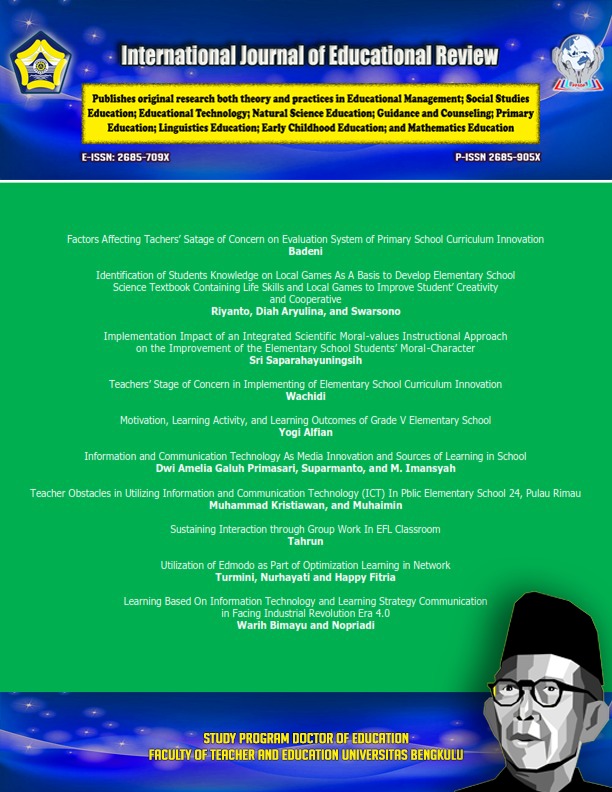The Impact of Implementing Merdeka Belajar Curriculum by Utilizing Digital Media on Changes in Knowledge, Attitudes and Skills of Madrasah Ibtidaiyah Al I'anah Students, Duren Village, Klari District, Karawang Regency
DOI:
https://doi.org/10.33369/ijer.v5i2.31286Abstract
Merdeka Belajar Curriculum is a curriculum of a set of plans and arrangements regarding the objectives, content and learning materials of the methods used as guidelines for organizing learning activities to achieve certain educational goals. The central government establishes a basic framework and curriculum structure which serves as a reference for the development of the operational curriculum for education units. According to the National Standards Agency, Merdeka Belajar is education so that students can choose subjects of interest. This is done so that students can optimize their talents. The purpose of this writing, namely to find out the impact of the implementation of the independent learning curriculum on the attitudes, knowledge and skills of Madrasah Ibtidaiyah Al'Ianah students in Duren Village, Klari Distric. Implementation method with observation and field studies.
References
Ahmad Fauzan, J. (2021). Buku Panduan Guru Pendidikan Agama Islam dan Budi pekerti Untuk SD Kelas IV (Teacher's Manual for Islamic Religious Education and Ethics for Elementary School Grade IV). Jakarta: Kementrian Pendidikan, kebudayaan,Riset Dan Teknologi Republik Indonesia . Andrew Fernando, P. (2020). Pengembangan Media Pembelajar. Yayasan Kita Menulis.
Alifah, F. N. (2019). Pengembangan Strategi Pembelajaran Afektif (Development of Affective Learning Strategies). Tadrib, 5(1), 68-86.
Badru Zaman, C. E. (2010). Media Pembelajaran Anak Usia Dini (Early childhood learning media). Pendidkan profesi Guru.
Cahaya, C. (2022). Peran Guru Pendidikan Agama Islam Dalam Menerapkan Kurikulum Merdeka Belajar Di Era Digital (The Role of Islamic Religious Education Teachers in Implementing the Independent Learning Curriculum in the Digital Age). Jurnal Bilqolam Pendidikan Islam, 3(2), 1-20.
Gunawan, I., & Palupi, A. R. (2016). Taksonomi Bloom–revisi ranah kognitif: kerangka landasan untuk pembelajaran, pengajaran, dan penilaian (Bloom's taxonomy-revised cognitive domain: a foundational framework for learning, teaching, and assessment). Premiere educandum: jurnal pendidikan dasar dan pembelajaran, 2(02).
Hendri, N. (2020). Merdeka Belajar; Antara Retorika dan Aplikasi (Merdeka Belajar; Between Rhetoric and Application). E-Tech: Jurnal Ilmiah Teknologi Pendidikan, 8(1), 1-29.
Manizar, E. (2017). Optimalisasi pendidikan agama islam di sekolah (Optimizing Islamic religious education in schools). Tadrib, 3(2), 251-278.
Nurwati, A. (2014). Penilaian Ranah Psikomotorik Siswa Dalam Pelajaran Bahasa (Assessment of Students' Psychomotor Domain in Language Lessons). Edukasia: Jurnal Penelitian Pendidikan Islam, 9(2).
Safitri, M. (2019). Pengaruh model pembelajaran project based learning dan problem based learning untuk meningkatkan berpikir kreatif matematis siswa (The effect of project-based learning and problem-based learning models to improve students' mathematical creative thinking). (Doctoral dissertation, UIN Raden Intan Lampung).
Sitzmann, T., Ely, K., Brown, K. G., & Bauer, K. N. (2010). Self-assessment of knowledge: A cognitive learning or affective measure?. Academy of Management Learning & Education, 9(2), 169-191.
Sopiansyah, D., Masruroh, S., Zaqiah, Q. Y., & Erihadiana, M. (2022). Konsep dan Implementasi Kurikulum MBKM (Merdeka Belajar Kampus Merdeka) (Concept and Implementation of the MBKM Curriculum (Merdeka Belajar Kampus Merdeka). Reslaj: Religion Education Social Laa Roiba Journal, 4(1), 34-41.
Sujiono, Y. N., Zainal, O. R., Rosmala, R., & Tampiomas, E. L. (2013). Hakikat Pengembangan Kognitif (The Nature of Cognitive Development). Metod. Pengemb. Kogn, 1-35.
Swarjana, I. K., & SKM, M. (2022). Konsep pengetahuan, sikap, perilaku, persepsi, stres, kecemasan, nyeri, dukungan sosial, kepatuhan, motivasi, kepuasan, pandemi covid-19, akses layanan kesehatan–lengkap dengan konsep teori, cara mengukur variabel, dan contoh kuesioner (Concepts of knowledge, attitude, behavior, perception, stress, anxiety, pain, social support, compliance, motivation, satisfaction, covid-19 pandemic, access to health services-complete with theoretical concepts, how to measure variables, and examples of questionnaires). Penerbit Andi.
Downloads
Published
How to Cite
Issue
Section
License

This work is licensed under a Creative Commons Attribution-ShareAlike 4.0 International License.




